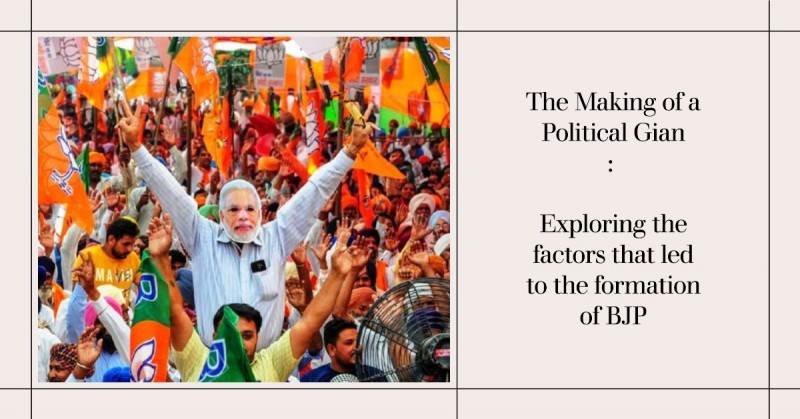
In the dynamic realm of Indian politics, the Bharatiya Janata Party (BJP) stands tall as a formidable force that has captivated the nation since its inception in 1980. Founded by a group of visionary leaders who voiced their dissatisfaction with the Indian National Congress (INC), the BJP emerged on the political landscape with a resounding goal: to champion Hindutva, a potent form of cultural nationalism that reverberates with the essence of India's Hindu identity.
Curious about how this political powerhouse came into existence? Let's delve into the factors that played a pivotal role in shaping the BJP's journey and catapulting it to the forefront of Indian politics.
Embracing Hindu Nationalism: The Voice of a Rising India
As the 1970s unfolded, an unmistakable wave of Hindu nationalism swept across India, entwining itself in the collective consciousness of the nation. This surge can be attributed, in part, to the rise of the Rashtriya Swayamsevak Sangh (RSS), a Hindu nationalist organization that laid the foundation for the BJP's forerunner, the Jana Sangh. As the RSS gained prominence, the notion of Hindu identity resonated profoundly with the Indian populace, setting the stage for the BJP's eventual emergence.
The Decline of the INC: Opening Doors for Change
For decades, the Indian National Congress had reigned supreme, enjoying an unrivaled position in Indian politics since the country's independence. However, the 1970s marked a turning point as the INC's once-unassailable dominion began to wane. Multiple factors contributed to this decline, including the tumultuous period known as the Emergency (1975-77) that was imposed by Prime Minister Indira Gandhi. Additionally, the rise of regional parties further eroded the INC's influence, leaving a void that yearned to be filled.
A Craving for Alternative Leadership: The Birth of the BJP
Amidst this political landscape, a yearning for new leadership and a fresh perspective swept through the nation. Dissatisfied with the INC's governance, many sought solace in the Bharatiya Janata Party, perceiving it as a modern and dynamic alternative. The BJP resonated with the concerns of the Hindu majority while simultaneously striking a chord with the middle class and the business community. This potent combination propelled the BJP forward as a beacon of change and reform.
Hindutva: The BJP's Founding Ideology
At the heart of the BJP's foundation lies the ideology of Hindutva, a concept that has sparked both controversy and fervent support. While Hindutva underscores the Hindu identity of India, it also encompasses a broader notion of cultural nationalism. This ideology has served as a driving force behind the BJP's success, allowing the party to mobilize the Hindu vote while still appealing to diverse segments of the population.
The Journey Continues: From Strength to Strength
The Bharatiya Janata Party's ascent has been nothing short of remarkable. Over the years, it has evolved into the dominant political force in India, and its influence shows no signs of waning. The factors discussed above have contributed to its indomitable rise, yet several other crucial elements have also shaped the party's trajectory.
The Janata Party Split: A Turning Point
In 1979, a significant turning point occurred with the split of the Janata Party, a coalition of opposition parties united in their mission to overthrow the INC during the 1977 general elections. However, internal divisions caused the Janata Party to fracture, creating an opportune moment for the BJP to establish itself as a new national entity. Seizing this chance, the BJP seized the spotlight and embarked on a path that would lead to unprecedented success.
The Narendra Modi Phenomenon
No discussion about the BJP's journey can be complete without acknowledging the pivotal role played by Narendra Modi. A charismatic leader, Modi's rise to power has been intertwined with the party's fortunes. As the Chief Minister of Gujarat from 2001 to 2014, he spearheaded the state's remarkable economic development, earning accolades for his astute governance. Modi's leadership, charisma, and captivating oratory skills were instrumental in securing the BJP's victory in the 2014 general elections, propelling him to the position of Prime Minister.
The Tapestry of BJP's Success
The Bharatiya Janata Party's success story is an intricate tapestry woven from the threads of diverse factors. The amalgamation of Hindu nationalism, the decline of the INC, the quest for new leadership, and the founding ideology of Hindutva have collectively propelled the BJP to the forefront of Indian politics. While the BJP's journey continues, its rise stands as a testament to the dynamic nature of Indian democracy and the ever-evolving aspirations of its people.
As the years unfold, the BJP's influence is expected to endure, leaving an indelible mark on the political landscape of India. The factors explored herein have shed light on the party's meteoric rise, offering insights into the triumphs and tribulations that have shaped the Bharatiya Janata Party into the force it is today.
Yoga: is India's Timeless Contribution to the World: President Murmu
India Wins Women's Emerging Asia Cup, Beats Bangladesh by 31 Runs
India's Population Puzzle: A Land of Diversity and Challenges